Can the "whole of society approach" to development cooperation enable more long-term strategic cooperation between Europe and Africa?
On 5 April 2019, the European Political Strategy Centre (EPSC) and the Directorate General for International Cooperation and Development(DG DEVCO) of the European Commission organised a workshop with 30 representatives of foundations, diaspora groups, the private sector, academia and social entrepreneurs in Brussels.
The workshop aimed to explore the possibility of developing new partnerships between European and African counterparts.
Whole-of-Society-Approach (Source: EPSC)
The participants were given the opportunity to exchange good practices or trends and discuss the role that the European Commission can play to further promote a “whole of society approach to development cooperation” and genuine “win-win-partnerships” in the future.
With the 2030 Agenda, we have for the first time a universal agenda that applies equally to developing and developed countries. This constitutes a paradigm shift in international relations and changes the relationship between the actors fundamentally: cooperation is evolving towards a partnership approach in which stakeholders from the North and South are working together to reach the Sustainable Development Goals.
Whole-of-Society-Approach
The new “Whole-of-Society-Approach” allows for more long-term strategic cooperation, involving not only governments, but also the private sector, local authorities, civil society organisations, NGOs, academia, foundations and international organisations.
They all contribute to the new Africa-Europe Alliance for Sustainable Investment and Jobs that Commission President Juncker proposed in his State of the Union speech in September 2018.
“It is a good thing that we engage in an Alliance between Africa and Europe. Our relationship is one of strategic proximity, take alone the distance. Only 14 km of sea are separating our two continents. In fact, we are twin-continents. We share a common destiny. This differentiates us from China or the US,” underlined Patrick Develtere, Principal Adviser at the European Political Strategy Centre.
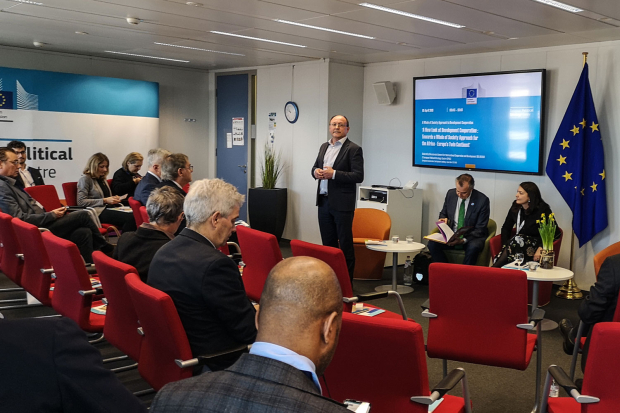
Workshop on a “Whole-of-society-approach” in Brussels on 5 April 2019
Indeed, Europe is Africa’s biggest trading partner today, accounting for 36% of trade in goods in 2017 (compared to 16% for China and 6% for the United States). In addition, the Cotonou Agreement recognised for the first time civil society organisations, local authorities and the private sector as fully-fledged legitimate development actors.
Thus, development cooperation has evolved considerably from a traditional development cooperation model to a “cooperation development model” where an ever-growing number of counterparts from Europe and Africa are looking for opportunities to collaborate, co-design and co-create.
Below you can find some of the presented projects and good practices that can inspire further cooperation between Africa and Europe:
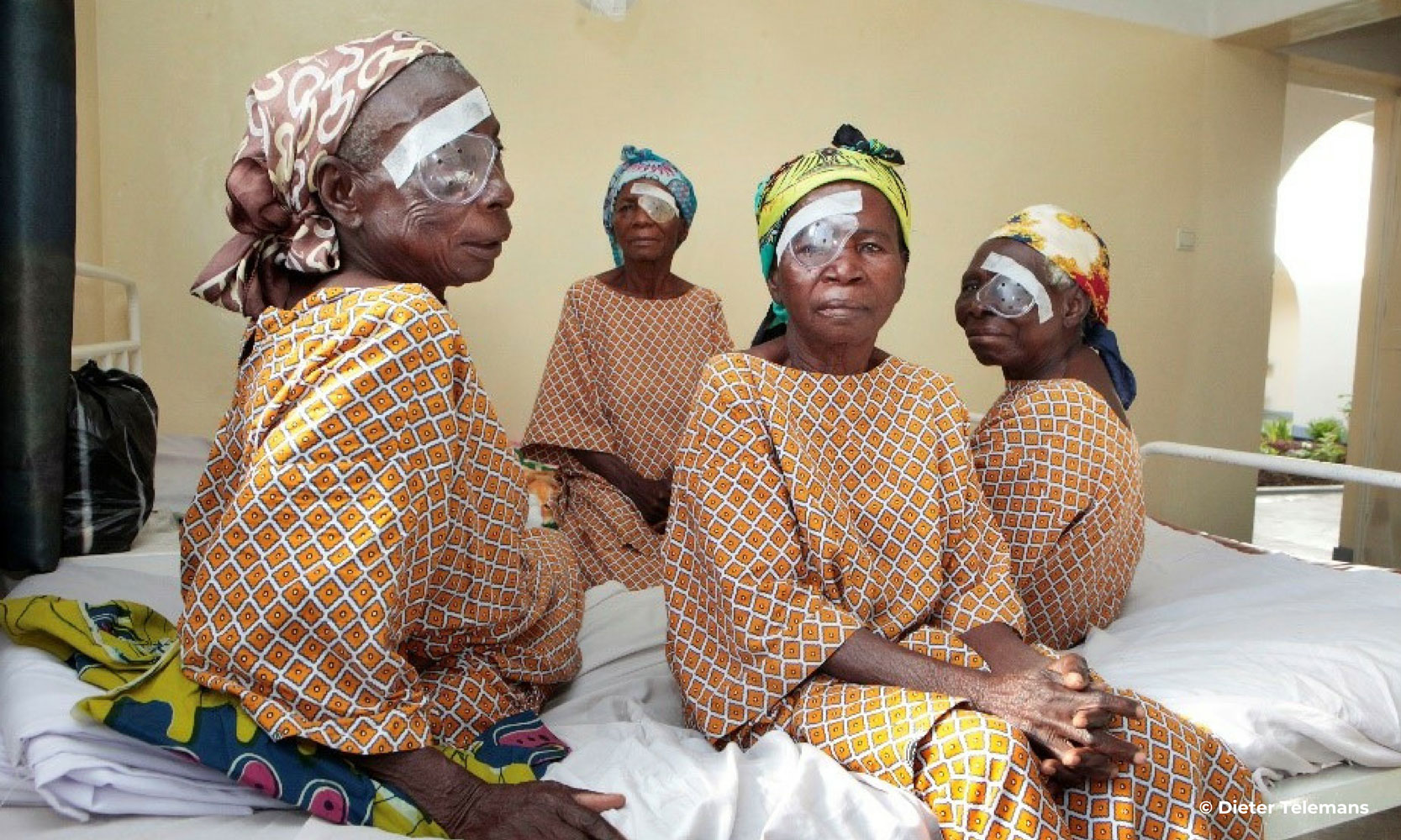
Eye care hospital in the South of the Democratic Republic of Congo
Health, social protection and social partners
Light for the World Belgium fights preventable blindness in Africa together with local partners and promotes the inclusion of visually impaired people in education. The organisation has developed a social franchising model for eye care hospitals which has been implemented in four locations in the South of the Democratic Republic of Congo. The social franchise enables a local partner to start up and manage a wholistic eye care hospital that provides eye consultations, performs eye operations, and has a pharmacy and an optical shop. It is set up in accordance with an organisational blueprint which defines the infrastructure, the equipment, the operational structure and the business processes.

Children at one of the eye care hospital in DRC
This innovative franchise model transfers knowledge and expertise and at the same time creates local ownership. The blueprint is the result of co-design, as the local partners are actively involved in its development which takes into account local culture and habits. Light for the World Belgium provides all the necessary support, training, and quality assurance to implement the blueprint.
“Thanks to our social franchising model for eye care private sector actors can play an important role in the development of a healthcare system and complement the government in this specialised domain of healthcare,” says Dirk Deceuninck, Chairman of Light for the World Belgium.

Coca-Cola Lead Cooler Technician, Maxwell Ayisi, reading the temperature gauge in a solar-powered vaccine cooler at a Community Health and Planning Services clinic in Ghana
The private sector
The Last Mile Project is a public-private partnership between the Coca-Cola Company and its Foundation, the United States Agency for International Development (USAID), the Global Fund to fight AIDS, Tuberculosis and Malaria and the Bill & Melinda Gates Foundation. This partnership is working together to make medicines, vaccines and health services as accessible as Coca-Cola products. The project works with governments and local Coca-Cola bottlers to develop a tailored supply-chain and strategic marketing solutions to strengthen public sector ability to reliably get life-saving medicines and vaccines to people when and where they are needed most.
Through a “Whole-of-Society-Approach” the unique skills and expertise of the partners involved are rallied behind a common objective, allowing for faster progress and mutual learning. “The Last Mile Project shows that great things can be achieved when like-minded organisations come together with a common goal,” says Adrian Ristow, Project Last Mile Director. “We are pleased that by working together on this initiative, The Coca-Cola Company’s supply chain and strategic marketing expertise can be put to use in improving delivery of life-saving medicines in communities across Africa.”

Reaching out to very remote areas in Africa where the solar-powered vaccine coolers transported by Coca-Cola can save lives
Agriculture peer-to-peer advice, training and exchange
Agriterra is an agri-agency founded in 1997 by the Dutch agricultural sector to strengthen farmers’ organisations worldwide.
Agriculture is the key to reducing poverty in poor rural areas and strengthening farmers’ organisations is a necessary condition for development, so the agency provides expert and peer-to-peer advice, training and exchange to cooperatives and farmers’ organisations, and also link them to (Dutch) businesses.
Agriterra is convinced that ambitious farmers in emerging economies want to develop themselves, become entrepreneurs or business partners, create added value and move up the supply chain.
Supporting these farmers with training, advice and exchange means creating jobs for a large group of people who would rather not be farmers but would like to stay in rural areas. Farmer cooperatives can therefore lead the gradual structural transformation process of rural areas.
One of the Agriterra’s recent initiatives is AgriCord: a network of 14 professional farmers’ organisations and their cooperative businesses from the EU, Canada, Africa, Latin America and Asia that have established agri-agencies, in order to support their colleagues in developing countries. The alliance supports 600 farmer organisations across the globe every year and organises 1000 farmer-to-farmer exchange missions per year, involving more than 2500 farmers. 30% of them are women and half of these activities are South-South exchanges. In Africa, for example, AgriCord is committed to enabling young farmers to make joint plans with respect to infrastructure (roads, electricity and internet) to initiate agro-industrial development. New profitable business models are envisaged and piloted to unlock rural creativity, in particular for young people.
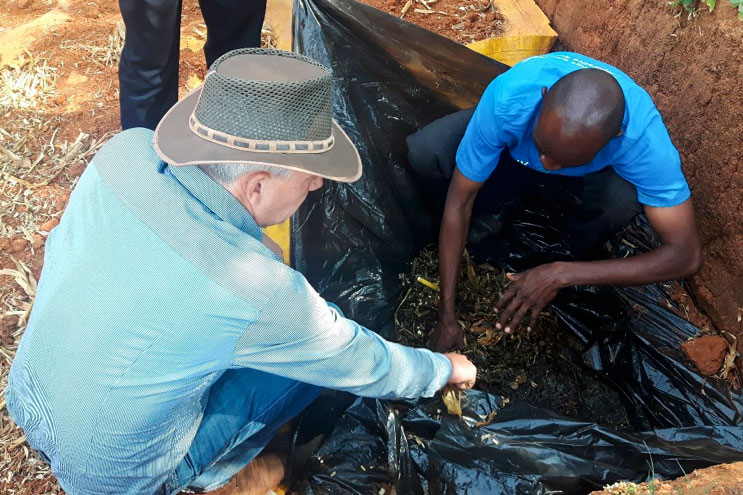
A farmer in Zambia with an Agriterra expert measuring the quality of silage
Universities – Science: a cross-faculty initiative for local innovation addressing global challenges
Trinity College Dublin is Ireland’s leading research university internationally renowned for the advancement of cutting-edge research to address issues of global, societal, environmental, ethical and economic importance.
In 2007, Trinity Development Initiatives (TIDI) was launched to maximise the university’s contribution to understanding and addressing major global development challenges through research and education activities.
TIDI is a cross-faculty initiative that undertakes research “at the frontiers of disciplines spurring on the development of new interdisciplinary fields and making a catalyzing impact on local innovation and addressing global challenges.”
So far TIDI has developed a range of strategic partnerships with academic institutions nationally and internationally, government agencies and non-governmental organisations in both low and high-income locations across the globe.
One example how TIDI puts the “Whole-of-Society-Approach” into practice is GATE (Gender Awareness and Transformation through Education), a project which was co-designed by Trinity College Dublin and Dar es Salaam University College of Education (DUCE) in Tanzania with the aim to support the development of gender expertise and capacities in research and education through the training of academics in gender-based research and education.
A Centre for Excellence will be set up in the framework of the project and the methodologies and theoretical learnings will be disseminated through peer-review journals and events. Through all these actions the envisaged impact is to increase the number of female students completing second level and third level education. The project wants to build a pipeline of future female role models and leadership that can influence national development and progress.

Workshop organised in the framework of the GATE-Project run by Trinity College Dublin
A series of workshops and staff trainings has been collaboratively delivered in 2019 with the most recent event receiving wide engagement from the academic community at DUCE.
The feedback from one of the participants confirms the success of the initiative: “The training has broadened my understanding on the meaning of gender. It has removed my misconception and attitude over gender issues and promoted my perspective on making a gender-based research.”
For further information on the “Whole-of-Society-Approach” please read the key-note address of Patrick Develtere, Principal Adviser of the European Political Strategy Centre.
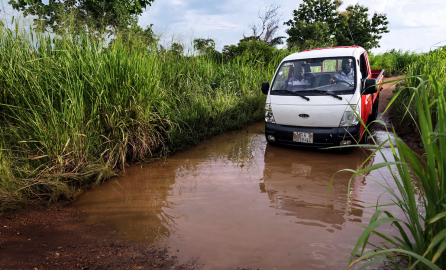
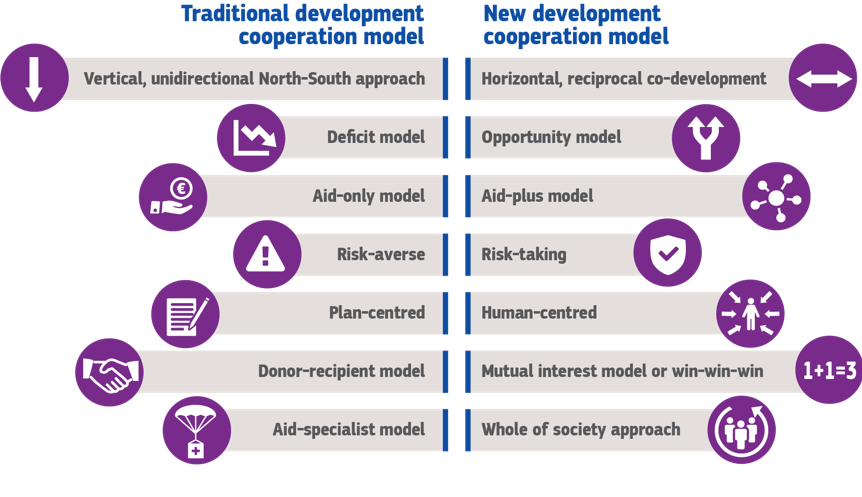
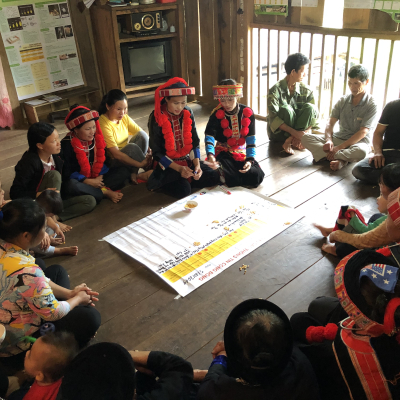

Log in with your EU Login account to post or comment on the platform.